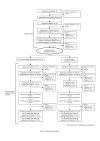Integrated communication support program for oncologists, caregivers and patients with rapidly progressing advanced cancer to promote patient-centered communication: J-SUPPORT 1904 study protocol for a randomised controlled trial
- PMID: 32967874
- PMCID: PMC7513597
- DOI: 10.1136/bmjopen-2019-036745
Integrated communication support program for oncologists, caregivers and patients with rapidly progressing advanced cancer to promote patient-centered communication: J-SUPPORT 1904 study protocol for a randomised controlled trial
Abstract
Introduction: Communication is an essential aspect of care for patients with progressive serious illnesses. This study aims to evaluate the efficacy of a new, integrated communication support program for oncologists, patients with rapidly progressing advanced cancer and their caregivers.
Methods and analysis: The proposed integrated communication support programme is in the randomised control trial stage. It comprises a cluster of oncologists from comprehensive cancer centre hospitals in a metropolitan area in Japan. A total of 20 oncologists, 200 patients with advanced pancreatic cancer and the patients' caregivers are enrolled in this study as of the writing of this protocol report. Oncologists are randomly assigned to the intervention group (IG) or control group (CG). Patients and caregivers are allocated to the same group as their oncologists. The IG oncologists receive a 2.5-hour individual communication skills training, and patients and caregivers receive a half-hour coaching intervention to facilitate prioritising and discussing questions and concerns; the CG participants do not receive any training. Follow-up data will be collected quarterly for 6 months for a year and then annually for up to 3 years. The primary endpoint is the intergroup difference between before-intervention and after-intervention patient-centred communication behaviours during oncology visits.
Ethics and dissemination: This study is conducted in accordance with the ethical guidelines for clinical studies published by Japan's Ministry of Education, Cultural, Sports, Science and Technology, the Ministry of Health, Labour and Welfare, and the ethical principles established for research on humans stipulated in the Declaration of Helsinki and further amendments thereto. The protocol was approved by the Institutional Review Board of National Cancer Center, Japan on 4 July 2018 (ID: 2017-474).
Trial status: This study is currently enrolling participants. Enrolment period ends 31 July 2020; estimated follow-up date is 31 March 2023.
Trial registration number: UMIN Clinical Trial Registry (UMIN000033612); pre-results.
Keywords: adult oncology; adult palliative care; mental health; social medicine.
© Author(s) (or their employer(s)) 2020. Re-use permitted under CC BY-NC. No commercial re-use. See rights and permissions. Published by BMJ.
Conflict of interest statement
Competing interests: None declared.
Figures
References
-
- Ministry of Health Labour and welfare, Japan: white papers & reports annual health, labour and welfare report, 2017.
-
- National Cancer Center Japan: cancer statistics in Japan, 2019.
-
- Parker SM, Clayton JM, Hancock K, et al. . A systematic review of prognostic/end-of-life communication with adults in the advanced stages of a life-limiting illness: patient/caregiver preferences for the content, style, and timing of information. J Pain Symptom Manage 2007;34:81–93. 10.1016/j.jpainsymman.2006.09.035 - DOI - PubMed
Publication types
MeSH terms
Associated data
- Actions
LinkOut - more resources
Full Text Sources
Medical

